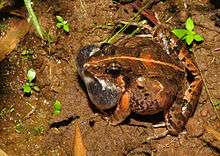Minervarya mudduraja
Minervarya mudduraja (common names: Muddu Raja fejervarya, Mudduraja cricket frog) is a species of frogs that is endemic to the Western Ghats, India.[1][2] It is named after the 17th century ruler Muddu Raja who founded Madikeri.[2]
| Mudduraja cricket frog | |
|---|---|
 | |
| Male vocalizing | |
| Scientific classification | |
| Kingdom: | Animalia |
| Phylum: | Chordata |
| Class: | Amphibia |
| Order: | Anura |
| Family: | Dicroglossidae |
| Genus: | Minervarya |
| Species: | M. mudduraja |
| Binomial name | |
| Minervarya mudduraja (Kuramoto, Joshy, Kurabayashi, and Sumida, 2008) | |
| Synonyms[1] | |
| |
Description
Minervarya mudduraja is a relatively large species among Minervarya from central Western Ghats. The species was described based on a female adult specimen as the holotype and three additional females as the paratypes.[2] The mean snout to vent length of females is 45 mm (1.8 in) (range 38–54 mm); longitudinal dermal ridges are found on the dorsum and are often arranged in four rows with an inverted V shaped ridge at the center; snout is pointed in dorsal and ventral views; head is wider than long; tympanum is large and distinct.[2]
Habitat and distribution
It is found along roadsides and around wetlands excepting wet paddy fields.[2] It is currently known from Mudigere and Madikeri in Karnataka.[1]
References
- Frost, Darrel R. (2018). "Minervarya mudduraja (Kuramoto, Joshy, Kurabayashi, and Sumida, 2008)". Amphibian Species of the World: an Online Reference. Version 6.0. American Museum of Natural History. Retrieved 19 July 2018.
- Kuramoto, M.; Joshy, S. H.; Kurabayashi, A.; Sumida, M. (2007). "The genus Fejervarya (Anura: Ranidae) in central Western Ghats, India, with descriptions of four new cryptic species". Current Herpetology. 26 (2): 81–105. doi:10.3105/1881-1019(2007)26[81:TGFARI]2.0.CO;2.
External links
| Wikimedia Commons has media related to Zakerana mudduraja. |
